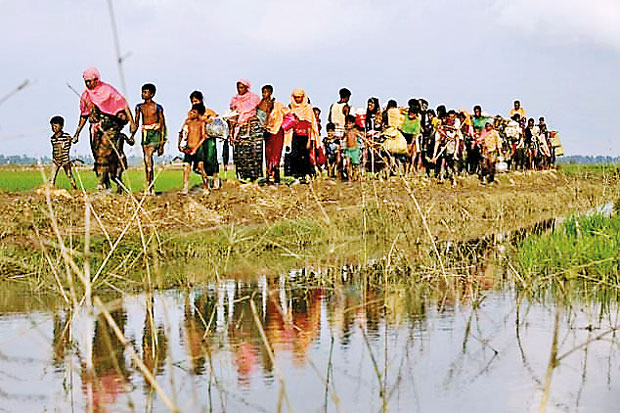Reply To:
Name - Reply Comment
Last Updated : 2024-04-25 04:33:00

By Max Bearak
(c) 2017, The Washington Post ·
Sep 11, 2017 -
Over the past 2½ weeks, the coastal borderland between Myanmar and Bangladesh has become the site of almost incomprehensible misery and suffering.
Around 300,000 people, most belonging to Myanmar’s Rohingya ethnic group, have fled with nothing but the clothes on their backs. They are escaping what many say is a scorched-earth campaign led by the Myanmar military to drive an unwanted, mostly Muslim minority from the country, complete with indiscriminate killing, systematic rape and the burning of entire towns.
Despite the evidence - which by Monday had led the United Nations’ chief human rights officer to call the atrocities “a textbook example of ethnic cleansing - the Myanmar military and government say they are not targeting civilians but rather a group of terrorists that claim to protect the Rohingya but are in fact militants bent on creating an Islamic state in southwest Myanmar’s Rakhine state.
The situation calls to mind the adage: One man’s “terrorist” is another’s “freedom fighter.”
The Rohingya (pronounced Ro-hin-ja) have been referred to as the world’s “most friendless people” and are undoubtedly in need of protection. For decades they have faced persecution and been denied citizenship in Buddhist-majority Myanmar, which is also known as Burma. With the country’s democratic reforms in 2011, ending half a century of military rule, many hoped the Myanmar government led by Aung San Suu Kyi, a Nobel Peace Prize laureate and self-proclaimed pacifist would provide that protection.
But Suu Kyi has no direct control over Myanmar’s military under the new constitution. And she also subscribes to the belief held by many in Myanmar that the Rohingya are essentially illegal Bangladeshi interlopers, despite evidence of their presence in the region for generations, if not centuries. The Myanmar government officially refers to the group as “Bengali.” Until recently, Bangladeshis felt similarly about the Rohingya. “Bangladeshis once had hatred for us,” a Rohingya man named Mohammed Yunus told The New York Times earlier this year. But now they have the idea that we are persecuted.”
That idea has spread far and wide, especially among Muslims around the world. Images and testimony shared by Rohingya have galvanized people from Chechnya to Jakarta to come out in mass protest against Myanmar’s treatment of the Rohingya. Bangladesh now hosts 750,000 Rohingya refugees, and the government in Dhaka recently described Myanmar’s actions as “genocide.” Only international pressure could persuade Myanmar to accept most of the refugees back, given that almost none would hold Myanmar citizenship.
According to an investigation by the International Crisis Group published last December, the plight of the Rohingya has also inspired wealthy individuals in Pakistan, Saudi Arabia and elsewhere to fund a ragtag insurgency.
When the report came out, the fledgling Rohingya militancy was known as Harakah al-Yaqin, Arabic for “faith movement.” The group now calls itself the Arakan Rohingya Salvation Army, or (ARSA). Money and weapons are channeled through groups of Rohingya expatriates living in the Persian Gulf and Bangladesh and eventually reach Myanmar, where local fighters receive training. The ICG report says that ARSA has growing popular support among Rohingya in Myanmar, but the recent crackdown was sparked by a co-ordinated Arsa attack on nine Myanmar border police posts that killed at least 12 officers last month. On the other hand, the crackdown may inspire many Rohingya to join the militants. Still, calling the conflict between the military and ARSA lopsided would be an understatement. ARSA likely has a only a few hundred fighters. There is little evidence that foreigners have joined the fight. On Sunday, ARSA declared a unilateral cease-fire, hoping to assuage the humanitarian crisis. The Myanmar government refused to enter into talks with them. The Rohingya remain deeply unpopular in Myanmar, but ARSA’s attacks, even if they pale in comparison to Myanmar’s retaliation, only widen the divisions and serve the government’s narrative. With the Myanmar military essentially treating all Rohingya men as possible terrorists, and effectively blocking humanitarian aid, the vicious spiral of persecution and militarization is in full spin.

Add comment
Comments will be edited (grammar, spelling and slang) and authorized at the discretion of Daily Mirror online. The website also has the right not to publish selected comments.
Reply To:
Name - Reply Comment
US authorities are currently reviewing the manifest of every cargo aboard MV
On March 26, a couple arriving from Thailand was arrested with 88 live animal
According to villagers from Naula-Moragolla out of 105 families 80 can afford
Is the situation in Sri Lanka so grim that locals harbour hope that they coul